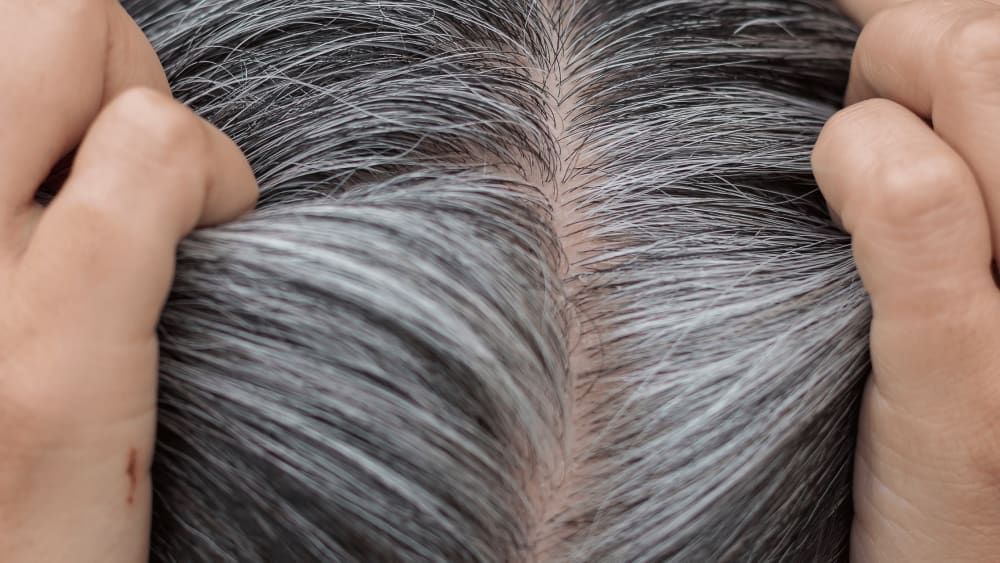Science Behind Premature Hair Greying
Premature greying is a condition where the hair strands have lost their pigmentation (greying) at an age earlier than they usually would.

What is premature hair greying?
Premature greying is a condition where the hair strands have lost their pigmentation (greying) at an age earlier than they usually would (prematurely). Premature greying occurs in Asians before 25 years, in Whites before 20 years and Africans before 30 years. Despite the loss of pigmentation from the hair, it is called greying and not whitening because the visual impression given by the admixture of the pigmented hairs and white hairs imparts it a grey shade. The loss of pigmentation occurs because the pigment cells (melanocytes) stop imparting melanin. Eumelanin is a brown-black pigment, and pheomelanin is a yellow or red pigment in hair keratin cells (keratinocytes) responsible for giving hair its colour.
Causes of premature hair greying
Genetics
Sometimes, it's just about the genes. A woman's genetic structure is one of the most typical causes for greying of hair. Studies have shown that patients with positive family history and parents who also face grey hair issues are more prone to developing grey hair prematurely.
Nutritional Factors
Greying of hair may be due to a deficiency in certain vitamins, minerals and proteins as well. Low levels of vitamin B-12, biotin, folic acid, vitamin D, vitamin E, zinc, iron and copper have been observed in people suffering from premature greying. Hence, it is no secret that nutrients are critical for hair pigmentation.
Stress
Stress aggravates early greying of hair. A study conducted by New York University showed that stress can decrease the activity of the pigment cells and can act as a triggering factor to precipitate greying of hair. Another study that showed early greying of hair was more common in people with higher educational qualifications. It may be possible that the academic stress they went through also could have had a role to play. A Turkish study showed that the stress scale score was higher in patients with premature greying than others.
Medical Conditions
The thyroid gland has a vital role to play in the normal metabolism and functioning of cells. Abnormality in the thyroid gland functioning seen in hyper and hypothyroidism can also lead to premature greying of hair. Autoimmune conditions like vitiligo and pernicious anaemia are also linked with greying of hair. Vitiligo is a condition in which a person’s immune system produces antibodies that attack the pigment-producing cells. Pernicious anaemia is a condition in which there is abnormal absorption of vitamin B12, thereby hampering the pigment cell activity.
Smoking
It has been shown that smokers are 2 1⁄2 times more prone to premature hair greying than non-smokers. Nicotine has the action of shrinking the tiny small blood vessels, which provide blood supply to the hair bulb and thereby, it can interfere with healthy blood circulation for the hair root. Also, various toxins in cigarettes have harmful oxidative damage-causing potential, which can also hamper healthy cell activity.
Alcohol & Obesity
A study was published that found alcohol to be significantly associated with premature greying of hair. One saw that the proportion of obese people with a body mass index of more than 30 kg/m2 was more significant in a group of patients with premature greying of hair compared to those who did not have this problem.
Frequent usage of hair dye
Certain dyes which contain hydrogen peroxide may also lead to an increase in greying because of the bleaching. This happens due to the action of hydrogen peroxide, which may cause damage to the pigment cells of the hair.
How to combat premature hair greying
Healthy diet for your hair
A healthy balanced diet is essential to avoid nutritional deficiencies and minimize the risk of developing premature greying of hair. Also, avoiding excess fast food and oily food to prevent obesity will be beneficial to minimize the chance of premature greying of hair.
Switching to a healthy lifestyle
A healthy lifestyle by avoiding smoking and minimizing alcohol consumption would also be beneficial to decrease the chance of premature greying of hair. It is also recommended to try to minimize mental stress as that can also have a detrimental role.

